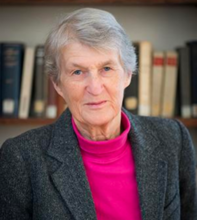Katerina Clark
Professor Katerina Clark, B. E. Bensinger Professor of Slavic Languages and Literatures and of Comparative Literature at Yale University, was a pathbreaking scholar of twentieth-century Russian and Soviet culture, one of the most influential Slavists and comparatists of her generation. Her work was instrumental in overcoming reductive and politicized approaches to the study of Soviet culture that were set by Cold War rivalries, and helped transform this field into an intellectually vibrant critical enterprise that continues to be a source of scholarly innovation. In particular, Professor Clark’s The Soviet Novel: History as Ritual (1981, three editions) has inspired generations of scholars and to this day remains the essential reference point on the subject. Her subsequent single-author books, Petersburg: Crucible of Cultural Revolution (1998); Moscow: The Fourth Rome (2011); and Eurasia Without Borders (2021) have inspired generations of scholars. She also helped to bring the work of Mikhail Bakhtin to an English-speaking audience through her biography Mikhail Bakhtin (co-authored with Michael Holquist, 1986)
Her books have been translated into Russian, Chinese, Japanese, Italian, Czech, Portuguese, and Spanish, a testament to the global impact of Professor Clark’s scholarship. They have garnered such major awards as the Wayne S. Vucinich Prize for the best book in Russian, East European or Eurasian Studies, the Historia Nova Prize for the best book in Russian intellectual history, and the Matei Calinescu Prize from the Modern Languages Association. In 2007, she received the AATSEEL Award for Outstanding Contributions to Scholarship, and in 1999 she served as President of the American Association for the Advancement of Slavic Studies (currently ASEEES).
In addition to her immense research contributions, she has also inspired and trained generations of young scholars in Slavic and Comparative Literatures. For over thirty years at Yale University, she was a much-loved colleague and mentor. Her passing is a huge loss for our community.
